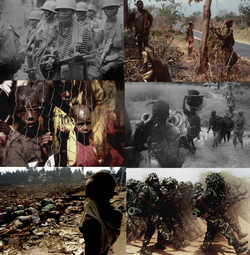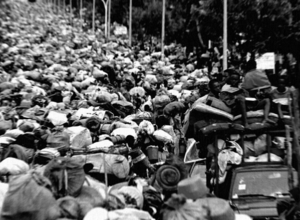Mabifian-Rwizikuran War
| Mabifian-Rwizikuran War | |||||||||
|---|---|---|---|---|---|---|---|---|---|
 | |||||||||
| |||||||||
| Belligerents | |||||||||
|
File:RwizikuruFlag.PNG Rwizikuru Supported by: Template:Country data Estmere |
Supported by: | ||||||||
| Commanders and leaders | |||||||||
|
File:RwizikuruFlag.PNG Izibongo Ngonidzashe File:RwizikuruFlag.PNG Fred Ngonidzashe File:RwizikuruFlag.PNG Munyaradzi Mhlanga † File:RwizikuruFlag.PNG Nokutendaishe Dulini File:RwizikuruFlag.PNG Jean-Marie Mombeshora |
| ||||||||
| Strength | |||||||||
| File:RwizikuruFlag.PNG 207,595 |
| ||||||||
| Casualties and losses | |||||||||
| File:RwizikuruFlag.PNG 89,635 killed |
| ||||||||
|
450,000 civilians killed ~3 million internally displaced persons and refugees | |||||||||
The Mabifian-Rwizikuran War (Rwizi: Hondo pakati peMabifia naRwizikuru, Ndjarendie: TBD) was a war in Bahia that lasted from 1968 until 1969, over the territory of Yekumavirira which had been under the control of Rwizikuru, that started when the Mabifian Democratic Republic attacked the Kingdom of Rwizikuru. At the end of the war, the Purple Line was established along the front lines, and a population exchange took place.
Names
In Mabifia
In Rwizikuru
- Hondo pakati peMabifia naRwizikuru - translating to "War between Mabifia and Rwizikuru," this is the term used in official documents and media, and is seen as a politically neutral term
- Hondo ye Yekumavirira - translating to "war for Yekumavirira," this is a commonly used vernacular term by Rwizikurans, and is seen as a politically neutral term
- Kukurirwa - translating to "the defeat," this is a commonly used vernacular term by Rwizikurans, especially those who were displaced from Yekumavirira as a result of the war
- Hondo Yekupona - translating to "war of survival," this was a commonly used propaganda term during the Mabifian-Rwizikuran War. Has fallen out of use since the 1980s
Background
Origins
The area in question, Yekumavirira, had historically been a part of the Ahirengeïe Kirole. this was an area of contested control between the Great Powers of Kambou and the Rwizi Empire. With the advent of Toubacterie, Ahirengeïe's coastal location saw it quickly claimed by the Gaullican Empire and the area was a focal point for missionary activity.
The transfer of Gaullica's Bahian territories to Estmere at the end of the Great War resulted in the addition of Ahirengeïe to their territory of Riziland, as it was seen to have closer ethnic and religious ties to Catholic and Ouloume Riziland as opposed to the more religiously diverse Mabifia. This ignored the historic ties of the Kirole to Mabifia, as well as the sizeable non-Sotirian population in the area.
Rwizikuran rule and growing tensions
Following political change in Rwizikuru and the country's withdrawal from the United Bahian Republic in 1963–4, policies to consolidate Rwizikuru as a Rwizi nation-state resulted in drastic curtailing of cultural autonomy in Yekumavirira by Izibongo Ngonidzashe. In 1965 Ngonidzashe ordered all schools across Rwizikuru to use the Rwizi language, and banned Kirobyi; this angered the Kirole, hitherto primarily taught in Estmerish and Kirobyi.
Ntare Musabyimana, in response to these policies, established the Yekumavirira Liberation Movement to advocate for increased autonomy for Yekumavirira. After the Port Vaugeois massacre in 1966 the YLM declared the beginning of an armed struggle against the Rwizikuran government; it also received support from the rump UBR, mainly the socialist government of Mabifia, from the outset. In response, entire Kirole communities in Yekumavirira were deported to internment camps on suspicions of potentially cooperating with UBR and especially Mabifian agendas.
The imminent disintegration of the remainer of the UBR made Mabifian elements attempt bolder actions to restore federal unity, or at least increase their leverage in the situation through access to the economic potential offered by the region; Gollobesare and its allies condemned Rwizikuran policies in Yekumavirira as genocidal, and threatened intervention. After Ngonidzashe's coronation as King of Rwizikuru in June 1968, Mabifia further denounced the establishment of 'reactionary despotism'. A buildup of troops began in late summer, and numerous border skirmishes occurred as Mabifian agents attempted to infiltrate Yekumavirira.
Events
Irregulars and agents embedded with the YLM in Yekumavirira began a series of attacks three days before war was officially declared, infiltrating the border, assassinating officials, liberating internment camps, and sabotaging infrastructure. War was officially declared by Pierre-Julien Onziema on October 6th, 1968, with a force of about 20,000 deployed to cross the Rwizikuran border. YLM militants and poorly disciplined Mabifian troops targeted Sotirians for reprisals, murdering Sotirian civilians and destroying villages indiscriminately.
Caught off guard by the sudden Mabifian attacks, it took until 11 October for Ngonidzashe to organize a counteroffensive with around 80,000 men. This managed to check the Mabifian advance; in the meantime atrocities began against the Kirole population. By October 20th, the Mabifian line had begun to retreat, as casualties were high, and outnumbered Mabifian units were encircled or wiped out. The fiasco even challenged Onziema's authority within Mabifia; after foiling a coup attempt against him, he purged the staff, and on November 5th appointed Christophe Kigu as the new front commander. In the meantime, Musabyimana's YLM was reinforced by forces that had finished training in Mabifia, acting as an effective yet brutal ranger force harassing the Rwizikurans. Elastic defense gave the Mabifians time to regroup around makeshift strongholds lined with trenches. From the end of November Mabifian forces also began receiving Dezevauni air support, while mobilized reinforcements stabilized the frontlines in Mabifia's favor.
In December the Rwizikuran forces were forced to retreat in the face of a Mabifian counteroffensive and YLM uprisings behind their front. On December 24th, Izibongo Ngonidzashe ordered to pull back troops to protect the major cities of Yekumavirira which were linked by the Mugwagwa, which went all the way to the then-capital of Port Fitzhubert. The Rwizikurans' own entrenchment and casualties suffered by the Mabifians halted major operations during January 1969.
In February, however, Kigu's forces made a brutal advance on Port Vaugeois; after scourging the countryside, his troops began probing and bombarding the city on February 24th. On March 2nd Mabifian troops began a direct assault on Port Vaugeois, initiating slow and bloody street fighting. Over the next few weeks, the Rwizikuran defenders attempted to use the urban environment of Port Vaugeois to their advantage and slow down the Mabifian advance. However, Dezevauni aerial interdiction of supplies entering the city forced the Rwizikurans to gradually withdraw to a perimeter around the city center, the harbor, and along the Mugwagwa. This line broke on March 16th, and shortly after the Rwizikurans abandoned the city. Mabifian troops and YLM irregulars engaged in the mass murder and rape of an estimated 2,000 Sotirian civilians as retribution; this caused an international fiasco for Onziema's government, and Kigu was dismissed for failing to ensure troop discipline.
After the Battle of Port Vaugeois, Mabifian forces pushed down the Mugwagwa, attacking retreating Rwizikuran forces. While some of Yekumavirira, centered on the town of Tchinamano, remained under Rwizikuran control, most of the area was lost by the 19th of March.
Negotiations
On the 20th of March, a ceasefire was agreed, in order to facilitate talks in Snarksburgh, Caldia. The peace talks began out of fear for the war growing far too out-of-control, as the conflict was soon dubbed conventional and high lethality. Over the course of five months, the Mabifian-Rwizikuran War had reached large numbers of casualties that was showing an affects on both economies. Onziema's government agreed to a ceasefire several days into the talks, however held out on the division of Yekumavirira. On the 21st a covert offensive was launched by propped up local groups to try and seize the remaining areas of Yekumavirira under Rwizikuran control, but it had ultimately failed to succeed in time.
Meanwhile in Snarksburgh, the Rwizikuran ambassador to Caldia, Tirivangani Chiweshe, suggested a population exchange, where all Sotirians residing in Yekumavirira will be repatriated to Rwizikuru, and all Kirole living there will be repatriated to Mabifia. He also suggested that "to prevent further hostilities," the ceasefire line should be designated as the international border between the two countries, and to have peacekeepers from the Community of Nations guard the ceasefire line.
(TBC)
Aftermath
war ends with the Treaty of Snarksburgh in Snarksburgh, Caldia, Purple Line established to prevent further conflict along the border of the former Yekumavirira region, and population exchange
(TBD)
Impact
One of the greatest impacts of the war was the expulsion of the Yekumaviriran Kirole people to Mabifia, and the expulsion of Yekumaviriran Sotirians to Rwizikuru as part of the Treaty of Snarksburgh which ended the war between the two countries.
Diplomatically, relations between Mabifia and Rwizikuru were non-existent until the collapse of the Mabifian socialist government in the Second Mabifian Civil War in 1978; in 1979 relations were re-established. In addition, Rwizikuru maintained its claim over Yekumavirira: while the areas remaining under Rwizikuran rule were transferred to the district of Ndarira in April 1969, the district of Yekumavirira still officially existed until the passage of the new Rwizikuran constitution in January 2020, when it was formally abolished.
(TBC)
